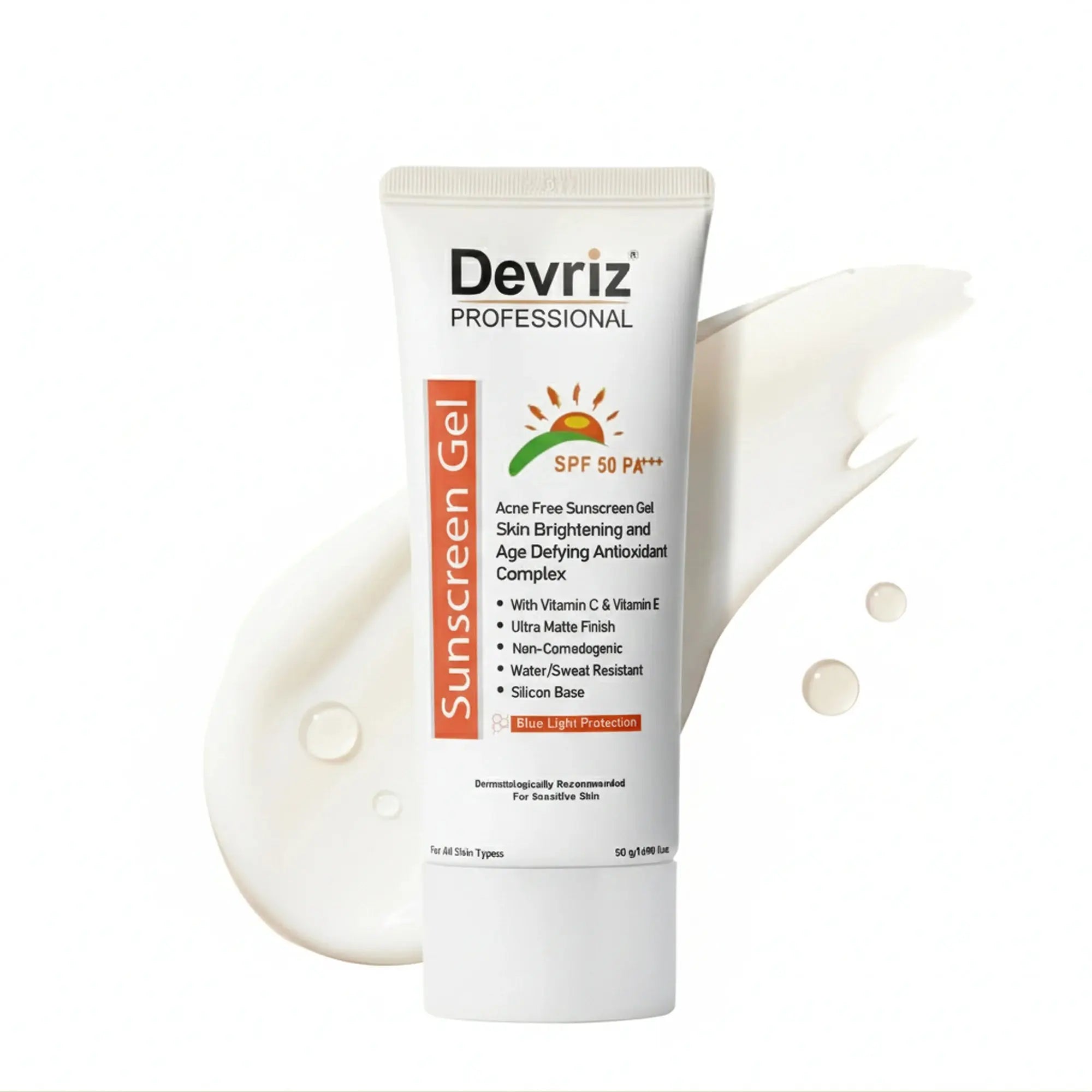Do you want to know how to clear blemishes and new breakouts? The blog will explain how to adopt an acne skincare routine with gentle, effective, or proven ingredients.

For the sake of good understanding ,it is best to study it into two types: Non-inflammatory and inflammatory acne.
The Non-inflammatory variant is clogged pores visible as blackheads or whiteheads. While Inflammatory are inflamed bumps typically larger than usual pimples.
Only applying blemish-busting products does not form the real example of acne-prone sensitive skin skincare.
It might involve lifestyle changes as well - the basics of which is a new and improved skincare routine for acne-prone sensitive skin.
What is Acne?
Acne is more than just pimples. It is a common skin problem that affects approximately 9.4% of the world’s population. Combined with sebum, the oil substance produced by our oil glands leads to inflammation and pore blockage.

Blackheads, Whiteheads, Pimples, and Cysts are the acne forms that emerge from blockage. Back, chest shoulders, and upper arms, are the common parts where acne appears, it might affect the face too.
Due to the frustrating nature of acne breakouts, they are categorised as the most common skin issue.
Causes And Prevention Of Acne
Clogged pores, excess hormonal changes (like puberty), oil production, and diet might also contribute to acne.

A simple skincare routine for acne is all that is necessary to treat or prevent acne. the need for a weekly skincare routine for acne-prone sensitive skin is to eliminate excessive oil, keep the pores clear, prevent the growth of acne-causing bacteria that cause inflammation and cysts referred to as pimples, and also support your skin’s healing so that existing blemishes might fade.
Acne And Skin Type
It’s common to find a link between oily skin and acne. Overproduction of oil is the primary reason for causing breakouts.

However, Dry Skin is still prone to acne for a number of reasons. Be it due to environmental factors or a bad skincare routine that contributes to skin irritation or pores clogging.
Sensitive skin can also suffer from acne. Harsh scrubs, using too many products at once, or other harsh topical medications contribute to acne in sensitive skin.
It is next to impossible to find the best skincare routine for acne without the side effects of irritating or worsening current breakouts on sensitive skin.
So having a good understanding of which Skin Type you have might also help you care for the Acne in the Best way Possible.
Fortunately, it’s easy to get the best acne treatment recommendations and products through consulting with a board-certified dermatologist.
For More Information You Can Read My Blog:- Get Rid Of Pimples Quickly
Why Is Having A Skincare Routine For Acne Important?
The importance of the best skincare routine for acne-prone skin lies in reducing acne breakouts and to promote skin health and glow.

The reason behind maintaining a daily skincare routine for acne is to reduce the number and severity of breakouts and to keep the skin looking as healthy and glowing as possible .
It’s quite easy to maintain a simple acne skincare routine, until you have a bad case of acne and suddenly need to seek the most drastic quick fixes available.
A gentle, yet, effective skincare routine for acne prone sensitive skin only takes a few minutes twice a day, and in case, if you have more severe acne and select to treat it with acne medication.
This routine will pave the way for clear, healthy skin so that the treatment turns out to be more effective.
How Can I Start Clearing My Acne Blemishes?
The main pillars of the best skincare routine for acne prone skin are skin type, acne type, and overall skincare goals.

This implies a comprehensive yet gentle skincare routine Sensitive Skin with targeted ingredients. Kojic acid is highly recommended for pimples, whiteheads, and blackheads. To help prevent pores from getting clogged with oil and improve the appearance of acne scars, Use Vitamin C.
It is better to stick to a single acne treatment to prevent irritation risk. Using more than one acne treatment product is likely to increase the likelihood of irritation. So, it is better to start slow or with caution and be attentive to how the skin responds.
Myth And Facts
There are many myths and facts centred around acne. Let’s highlight some of the Prominent ones:
Myth: Only Teenagers Get Acne
Fact: Nearly 25% of adult men and 50 % of adult women suffer from certain forms of acne.
Myth: Acne Occurs Due To Genetics
Fact: While genetics do have a role to play. Recent Research has linked Rise in Blood sugar leading to instances of acne breakouts.
Myth: Dirty Skin Causes Acne
Fact: Acne does not occur because of uncleanliness. Washing Face two times a day is sufficient to eliminate bacteria or surface oil.
What Is Blemish-Prone Skin And Acne?
Splitting acne into two main categories is one of the best ways of understanding it. There are mainly two types of acne: Inflammatory and Non-inflammatory.

The main form of non-inflammatory acne is blackheads or whiteheads. It’s typically mild in form and easily visible. Blackheads are dark in colour and appear as small bumps on the skin with a black tip.
The Black tip might be very small and flat against the surface. Whiteheads ,on the other hand, are small skin coloured bumps with a white tip.
Acne with red or robust appearance falls under the category of inflammatory acne. Papules, pastules to more severe nodules and cysts form inflammatory acne.
Most of these acne forms are inflammatory in nature and typically larger than the usual pimple.
Acne is also confused with rosacea. Of the four types of rosacea ,the one having most close resemblance with acne is acne rosacea.
This type causes acne -like breakouts.
Acne vulgaris is also another common type of acne marked by inflammatory and non inflammatory lesions.
People can possibly experience both acne vulgaris and acne rosacea at the same time.
Examples of Acne Vulgaris involve pimples, blackheads, cysts and other kinds of acne.
You Can Also Read more:- Best Night Cream For Pigmentation
What Does An Anti-Acne Skincare Routine Look Like?
It is important to design the right anti-acne skincare routine for acne prone as the wrong regime can end up causing more problems.

A complete, yet, effective natural skincare routine comprises Ingredients to look for, Morning Skincare Routine, Evening Skincare Routine.
Ingredients To Look For
The main products that will be useful to treat acne are face wash and Night cream .Face wash infused with Kojic acid unclogs pores and minimizes inflammation. It works best for blackheads and whiteheads. Another Ingredient in face wash that blocks acne-causing bacteria and thus, best for preventing inflammatory acne is vitamin C. Mulberry Extract enriched night cream works to treat blemishes and acne on skin. Grapes Derivative works to treat the growth of the bacteria that causes acne safely.
Morning Skincare Routine

Morning AM skincare routine is crucial as it improves your skin’s health. Cleansing skin is non-negotiable . Use devriz Foam Face wash. next in the line is devriz Glowing Face Serum, to improve skin texture, while hydrating it.
Apply Devriz SPF 50 sunscreen gel. Sunscreen will help to improve your skin’s sensitivity to sunlight. For convenience , You can also go to devriz healthcare website and look for best deals on skincare kits that comprise all these three Skincare Products.
Evening Skincare Routine

To get rid of a great deal of grime on your skin’s surface, Cleanse your face using the recommended face wash in the Morning AM segment. You can also take the support of a spot treatment, for example, an Acne and Pimple kit from Devriz Healthcare.
In addition to Face wash, You can apply the Pigmentation Night Cream, to target dark under-eye circles and prevent new acne breakouts. The products together in the kit treat existing Pimples and acne.
For More Information You Can Also Read:- Best Ways To Remove Dark Spots On Face
When To see A Dermatologist About Your Acne
The treatments for Acne vary as per the severity of the acne concerned. While over- the -counter products are usually helpful to treat mild acne.

If the problem persists, you might book your appointment with an experienced and board certified dermatologist. You can consult with our experienced dermatologist at Kotil skin care clinic who can help you with your acne issues .
This is applicable for all kinds of acne ranging from moderate or severe, like cystic acne or acne that’s scarring your skin. These kinds require prescribed medication.
In the initial stage of appointment , you will be asked to provide the details of your medical history and current skincare routine for acne.
You will undergo skin examination to check if you have acne and if you have acne, what type it is.
You will probably move out with a combination of prescribed medication ( Topical , oral or both ) and certain lifestyle suggestions. You can also opt for non -invasive treatments to help soothe the skin and reduce acne scarring.
Remember to go for regular check ups as the dermatologist will want to check how the skin is progressing and upgrade or rather customised treatment plan accordingly.
Conclusion
Patience is the key here. Stay consistent with the aforementioned acne treatment for nearly about 1 month before you try a new one. 3 months is the required time to see the visible results. If not getting any improvement? Think of visiting a dermatologist for a piece of personalised skincare routine for acne- prone advice as per your skin type and severity of acne.
Also, keeping in mind the fact that beauty is personal, You can browse the internet to get advice on a group of writers, educators and other experts to get tips on everything from how to use over- the - counter products and avail the best possible personalised medical Treatments.
FAQs
Q1. Can I Skip Moisturising If I have acne-prone skin?
Ans: If you have acne, your daily skincare should include a gentle face cleanser, non -non-comedogenic moisturizer, and sunscreen (for daytime). It means moisturiser is important if you have acne -prone skin.
Q2. Are natural remedies effective for treating acne-prone skin?
Ans: Natural remedies are 100 percent effective to treat acne. When used in combination with other substances like tretinoin cream or tea tree oil, might improve acne.
Q3. How to clear acne-prone skin?
Ans: wash your face and other acne parts. Massage gently using your fingertips.
Q4. Why is my acne so sensitive?
Ans: As your body recognizes that Dead skin, oil, and bacteria are inherently found in the outer hair follicle. Thus, as your body works to push it outwards, you tend to get more sensitivity in the area.
For More Information You Can Read My Top 5 Blog:-
Is SPF 50 Sunscreen Good For The Face?
How To Apply Sunscreen On Face Daily
How To Use Night Cream
Which Face Serum is Best for Skin?
How To Remove Pigmentation From Face





